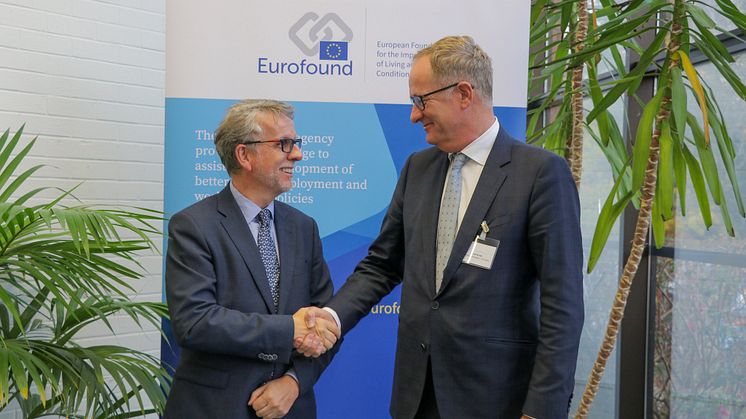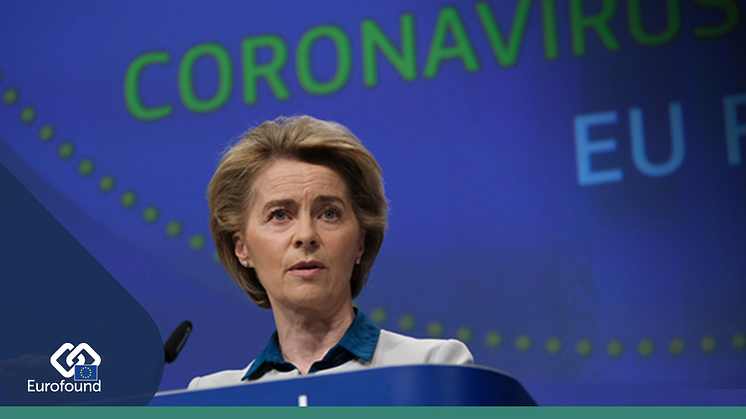
News -
Safeguarding fair, well-functioning and balanced industrial relations in Europe key to inclusive growth and progress
(DUBLIN, IRELAND): Safeguarding and promoting fair, well-functioning and balanced industrial relations is critical to ensuring inclusive and sustainable growth and social progress in the EU. In the wake of COVID-19, it will also be an important way for policymakers to integrate the social and economic dimensions of the EU, as set out in the European Pillar of Social Rights. Eurofound’s new flagship report ‘Challenges and prospects in the EU: Industrial relations Developments 2015-2019’ provides an overview of developments in industrial relations and social dialogue in recent years, prior to the COVID-19 outbreak. These are placed in the context of the key developments in EU policy affecting employment, working conditions and social policy, and linked to the work done by social partners – as well as public authorities – at European and national levels.
In recent years, the backdrop to developments in industrial relations and social dialogue was one of positive economic and labour-market trends, as recovery from the financial crisis took hold. Yet, the measures taken during the financial crisis frequently weakened the institutions and processes of industrial relations, and though some such measures have been rolled back, others remain in force. Add to this the ongoing process of structural change affecting labour markets and the more recent impact of COVID-19 and the policy response to it, and it is clear that the context is challenging.
‘At European level, the European Commission has in recent years pursued an active social policy agenda, including steps to relaunch social dialogue,’ says Maria Jepsen, Eurofound’s Acting Executive Director. ‘An impressive volume of joint initiatives has emerged from the European social dialogue, however few agreements have been concluded. There is concern that lately social partner requests to implement agreements through European legislation have been rejected.’
European social dialogue depends on strong links to the national level, both to ensure that the agenda at European level is of relevance and to facilitate meaningful implementation of what is agreed. Investing in social dialogue in ‘good times’ helps to ensure that it can be depended on in times of crisis. A review of first policy responses to the COVID-19 pandemic shows that social partner involvement was generally more robust in those countries where social dialogue has traditionally played an important role.
National systems of industrial relations remain very diverse within the EU, with important variations in the respective roles for legislation and collective bargaining in regulating the employment relationship, the structure and strength of trade union and employer organisations, the coverage of collective bargaining, and the role of workplace employee representation.
This diversity is mapped and quantified in Eurofound’s analysis of varieties of industrial relations. The core of this work focuses on the concept of industrial democracy, broadly understood as the governance of the employment relationship based on social dialogue, collective bargaining and workers’ participation at company level. The findings suggest a clear division between two main groups of countries – Nordic and continental countries which record the best scores in industrial democracy and, on the other hand, southern, liberal and central and eastern Member States, which perform far worse.
Falling trends in trade union density are a matter for concern in many Member States. This raises questions about the capacity of trade unions to defend the interests of their members and the wider workforce.
Collective bargaining remains the core of industrial relations systems across Europe. Although it remains vibrant in many Member States it faces challenges in others. By its role in setting pay, collective bargaining plays a crucial part in distributing through the economy the benefits of productivity gains. This function is critical to ensuring sustainable and inclusive growth. The COVID-19 crisis has shown that the time is right for new initiatives to promote, strengthen and underpin collective bargaining.
Fewer than one in three workplaces (with 10+ workers) in the EU (29%) has some form of employee representation. Legislative requirements are a key driver for the presence of such representation. Employee representatives in smaller establishments are the least well-resourced in terms of access to funding, training or paid time-off. Where employee representatives are in place, they do not see the direct involvement of employees as a ‘threat’. However, despite the impressive number of cases where important organisational change had been preceded by some form of social dialogue, employee representatives remain sceptical about their influence.
This flagship report consolidates findings in the industrial relations field from research conducted by Eurofound over the course of its multiannual work programme for 2017–2020. It considers the strengths and weaknesses of European social dialogue, including the linkages with national social dialogue and the capacity constraints of the actors. A national comparative analysis draws on projects that have mapped the key features of national industrial relations systems. The report also includes an analysis of new data from the 2019 European Company Survey on social dialogue in European establishments.
More information
- Topic page: Industrial relations
- Data: Minimum wages in Europe










